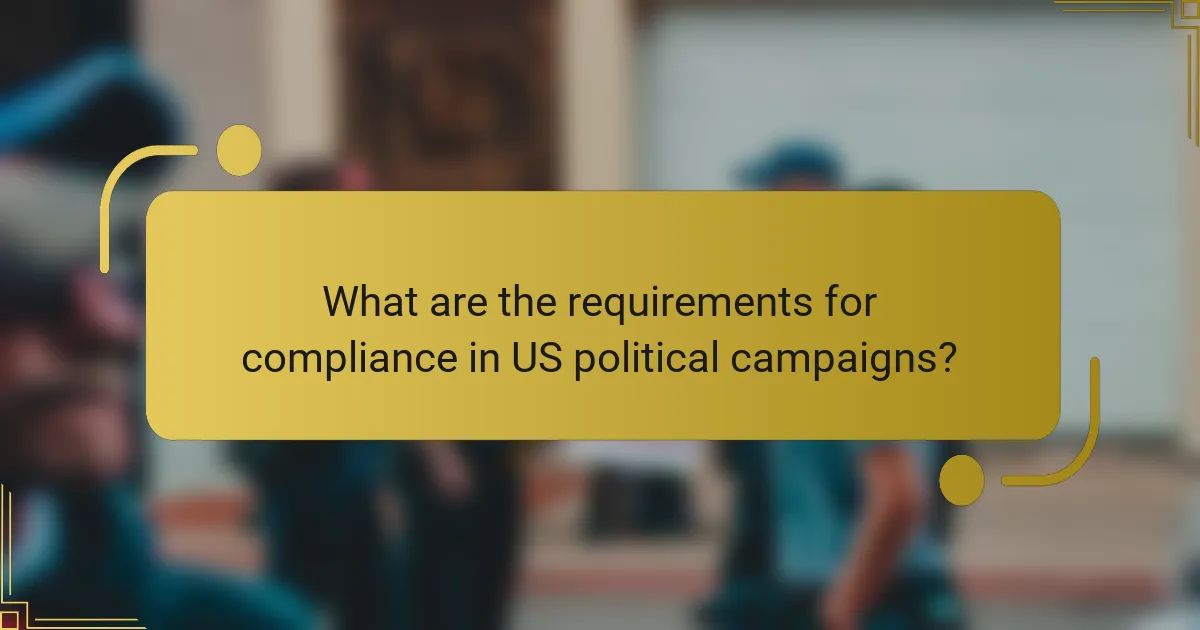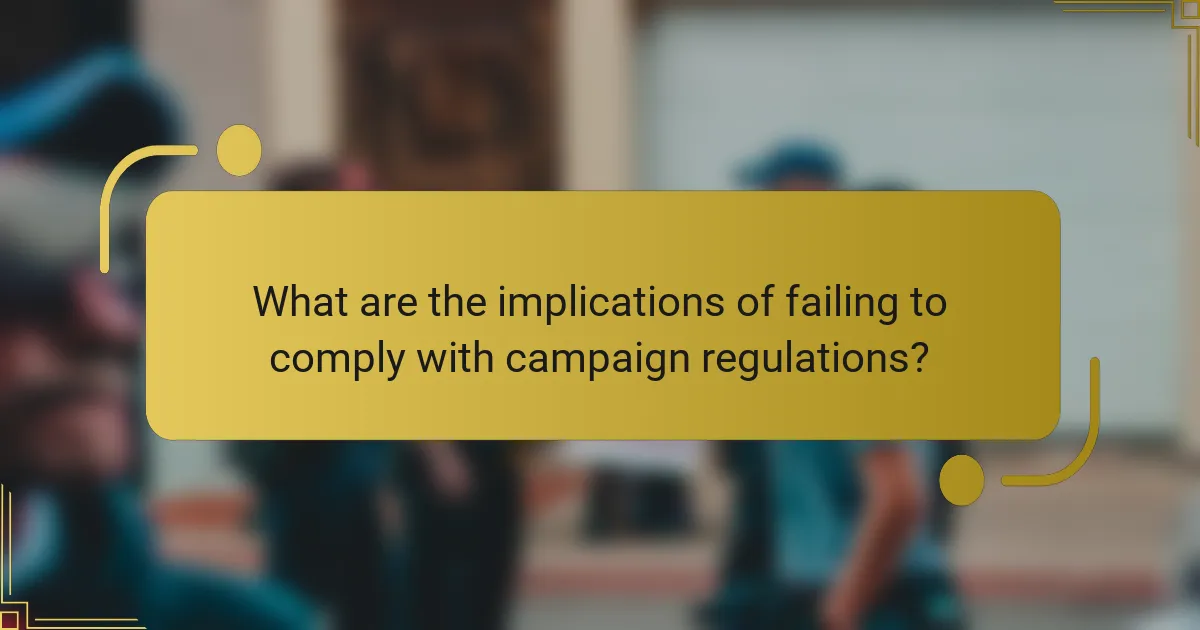The article focuses on the legal regulations governing political campaigns in the United States, primarily highlighting the Federal Election Campaign Act (FECA) and the Bipartisan Campaign Reform Act (BCRA). It details the requirements for campaign financing, including contribution limits, disclosure mandates, and the oversight role of the Federal Election Commission (FEC). The article also addresses the implications of non-compliance, such as fines, legal action, and reputational damage, emphasizing the importance of transparency and accountability in campaign activities. Additionally, it discusses significant Supreme Court rulings that have influenced campaign finance laws, particularly regarding corporate and union spending.

What are the key legal regulations governing US political campaigns?
The key legal regulations governing US political campaigns include the Federal Election Campaign Act (FECA), which regulates campaign financing. FECA mandates disclosure of campaign contributions and expenditures. It limits individual contributions to candidates and political parties. The Bipartisan Campaign Reform Act (BCRA) further restricts soft money contributions. The Federal Election Commission (FEC) oversees compliance with these regulations. Additionally, Supreme Court rulings, such as Citizens United v. FEC, have impacted campaign finance laws. These rulings allow for increased spending by corporations and unions. Transparency and accountability are essential components of these regulations.
How do federal laws impact political campaign operations?
Federal laws significantly regulate political campaign operations. They set rules for campaign financing, advertising, and disclosures. The Federal Election Commission (FEC) enforces these laws. Campaigns must report contributions and expenditures. Limits exist on individual and organizational donations. Violating these laws can result in fines or legal action. Transparency is mandated to inform voters about funding sources. Compliance with these regulations is crucial for campaign legitimacy.
What are the main federal statutes that regulate political campaigns?
The main federal statutes that regulate political campaigns are the Federal Election Campaign Act (FECA) and the Bipartisan Campaign Reform Act (BCRA). FECA was enacted in 1971 and amended several times. It establishes rules for campaign financing, including contribution limits and disclosure requirements. BCRA, also known as McCain-Feingold Act, was enacted in 2002. It aims to address issues of soft money and electioneering communications. These statutes are enforced by the Federal Election Commission (FEC). They ensure transparency and fairness in the electoral process.
How do federal regulations differ from state regulations?
Federal regulations are established by the federal government and apply nationwide, while state regulations are created by individual states and apply within their borders. Federal regulations often set minimum standards that states must follow, but states can implement stricter rules. For example, federal campaign finance laws limit contributions to candidates, whereas states may have their own limits that differ from federal ones. Additionally, federal regulations are enforced by federal agencies, while state regulations are enforced by state authorities. This dual system can lead to variations in compliance requirements for political campaigns across different states. Such differences can impact how campaigns strategize their fundraising and reporting efforts.
What role do agencies play in enforcing campaign regulations?
Agencies play a critical role in enforcing campaign regulations. They ensure compliance with laws governing political campaigns. The Federal Election Commission (FEC) is the primary agency overseeing federal campaign finance laws. The FEC monitors contributions and expenditures to prevent illegal practices. It investigates violations and can impose penalties for non-compliance. Additionally, state agencies enforce local campaign regulations. These agencies provide guidance to candidates on legal requirements. They also facilitate transparency in campaign financing. This enforcement is essential for maintaining the integrity of the electoral process.
How does the Federal Election Commission (FEC) oversee compliance?
The Federal Election Commission (FEC) oversees compliance through monitoring and enforcing campaign finance laws. It requires candidates, parties, and political committees to file regular financial reports. These reports detail contributions and expenditures, ensuring transparency. The FEC conducts audits to verify compliance with these regulations. It investigates potential violations of campaign finance laws. The commission can impose penalties for non-compliance. Additionally, the FEC provides guidance and resources to help entities understand their obligations. These measures ensure adherence to the Federal Election Campaign Act.
What are the consequences of non-compliance with campaign regulations?
Non-compliance with campaign regulations can lead to severe penalties. These penalties often include fines imposed by regulatory bodies. For example, the Federal Election Commission (FEC) can assess fines for violations. In some cases, non-compliance may result in criminal charges. Individuals involved may face imprisonment if found guilty of serious offenses. Additionally, campaigns may lose their eligibility for public funding. Non-compliance can also damage a campaign’s reputation and public trust. This can lead to decreased voter support and campaign effectiveness.

What are the requirements for compliance in US political campaigns?
Political campaigns in the US must comply with federal and state regulations. These regulations include registering with the Federal Election Commission (FEC) for federal campaigns. Campaigns must disclose their financial contributions and expenditures. They are required to report contributions over a specific threshold, which is currently $200. Campaigns must adhere to contribution limits set by the FEC. These limits vary based on the type of contributor, such as individuals, political action committees, or party committees. Additionally, campaigns must ensure that all advertisements include proper disclaimers. Violations of these compliance requirements can lead to penalties, including fines or legal action.
What are the primary compliance obligations for political candidates?
Political candidates have primary compliance obligations that include adhering to campaign finance laws. They must report contributions and expenditures to the Federal Election Commission (FEC). This reporting is required for both federal and state elections. Candidates must also ensure that all campaign advertisements comply with disclosure requirements. Additionally, they need to maintain accurate records of all financial transactions. Failure to comply with these obligations can result in penalties or legal action. These regulations are outlined in the Federal Election Campaign Act (FECA), which governs campaign financing in the United States.
How should candidates report contributions and expenditures?
Candidates should report contributions and expenditures by filing detailed financial reports with the Federal Election Commission (FEC). These reports must include the names and addresses of contributors who donate over $200. Expenditures must be categorized and itemized, showing the purpose and amount spent. Reporting deadlines are crucial and vary based on the election cycle. Candidates must also comply with state-specific reporting requirements. Accurate and timely reporting is essential to ensure transparency and adherence to campaign finance laws. Failure to report correctly can result in penalties and legal repercussions.
What are the deadlines for filing compliance reports?
Deadlines for filing compliance reports vary by jurisdiction and type of report. Generally, federal election compliance reports must be filed with the Federal Election Commission (FEC) on specific dates. For example, quarterly reports are due on the 15th day of the month following the end of each quarter. Pre-election reports have deadlines that are set in relation to the election date. Additionally, post-election reports must be submitted by a set date after the election concludes. State and local jurisdictions may have their own deadlines, which can differ significantly. It is crucial for campaigns to check both federal and local regulations for exact dates.
What documentation is necessary for ensuring compliance?
Necessary documentation for ensuring compliance in US political campaigns includes financial reports, contribution records, and expenditure statements. Financial reports detail all income and spending, ensuring transparency. Contribution records track all donations received, specifying donor information and amounts. Expenditure statements outline how funds are spent, supporting accountability. These documents must adhere to Federal Election Commission (FEC) regulations. Accurate and timely filing of these documents is crucial for compliance. Non-compliance can result in penalties or legal action, highlighting the importance of proper documentation.
What types of records must campaigns maintain?
Campaigns must maintain financial records, contribution records, and expenditure records. Financial records include detailed accounts of all income and spending. Contribution records document all donations received, including the donor’s information. Expenditure records track all campaign spending, specifying the purpose and amount. These records are essential for compliance with Federal Election Commission regulations. Accurate record-keeping helps campaigns report financial activities transparently. Failure to maintain these records can result in legal penalties or fines.
How can campaigns ensure accurate financial reporting?
Campaigns can ensure accurate financial reporting by implementing strict internal controls and regular audits. Establishing a clear accounting system is essential for tracking all financial transactions. Training staff on compliance regulations helps maintain adherence to legal standards. Utilizing software designed for campaign finance can streamline reporting processes. Regularly reconciling bank statements with campaign records prevents discrepancies. Engaging external auditors provides an objective review of financial practices. Transparency in financial reporting builds trust with donors and the public. According to the Federal Election Commission, accurate reporting is critical for legal compliance and maintaining campaign integrity.

What are the implications of failing to comply with campaign regulations?
Failing to comply with campaign regulations can lead to severe legal consequences. Violators may face fines imposed by regulatory bodies such as the Federal Election Commission (FEC). These fines can range from minor penalties to substantial amounts depending on the severity of the violation. Additionally, non-compliance can result in criminal charges in extreme cases, which may include imprisonment. Campaigns may also suffer reputational damage, leading to loss of public trust and support. Furthermore, candidates may be disqualified from running for office or face restrictions on future campaign activities. Historical cases, such as the 2012 election violations, underscore these implications, where candidates faced significant legal repercussions for non-compliance.
What are the potential legal repercussions for non-compliance?
Potential legal repercussions for non-compliance in US political campaigns include fines, penalties, and criminal charges. The Federal Election Commission (FEC) can impose civil penalties for violations of campaign finance laws. These fines can range from a few hundred to several thousand dollars, depending on the severity of the violation. In severe cases, non-compliance may lead to criminal prosecution. Individuals found guilty of willful violations may face imprisonment and substantial fines. Additionally, non-compliance can damage a campaign’s reputation and lead to loss of public trust. Historical cases, such as the 2016 election violations, illustrate these potential consequences.
How can violations affect a candidate’s campaign?
Violations can significantly damage a candidate’s campaign. They may lead to legal penalties, including fines or disqualification. Public perception often shifts negatively, resulting in loss of voter trust. Media coverage can amplify the impact, drawing attention to the violations. Historical examples show that candidates facing legal issues often see a decline in support. For instance, in 2016, a candidate’s campaign weakened after allegations of campaign finance violations emerged. Compliance with regulations is crucial to maintain credibility and support. Overall, violations can derail a campaign’s momentum and effectiveness.
What are the financial penalties associated with non-compliance?
Financial penalties for non-compliance in US political campaigns can be substantial. Violations of campaign finance laws may result in fines ranging from hundreds to thousands of dollars. For example, the Federal Election Commission (FEC) can impose civil penalties that often start at $5,000 for minor infractions. Serious violations can lead to fines exceeding $100,000. Additionally, repeated non-compliance may lead to increased scrutiny and further financial repercussions. Enforcement actions can also include the requirement to return illegally obtained contributions, which adds to the financial burden. These penalties aim to ensure transparency and accountability in campaign financing.
What are the long-term effects of regulatory compliance on political campaigns?
Regulatory compliance has significant long-term effects on political campaigns. It enhances transparency and accountability in campaign financing. Compliance reduces the risk of legal penalties and fosters public trust. Campaigns that adhere to regulations often attract more donations. They can also build a positive reputation among voters. Over time, compliant campaigns may influence voter engagement and turnout. Studies indicate that transparency in funding correlates with increased voter confidence. Therefore, regulatory compliance shapes not only campaign practices but also electoral outcomes.
How can compliance enhance a campaign’s credibility?
Compliance enhances a campaign’s credibility by ensuring adherence to legal regulations. This adherence builds trust among voters and stakeholders. When a campaign follows rules, it demonstrates transparency and accountability. Voters are more likely to support campaigns that operate within legal frameworks. Studies show that compliance can positively influence public perception. For instance, campaigns that disclose funding sources are viewed as more trustworthy. Compliance also mitigates risks of legal penalties, which can damage reputations. Overall, adherence to regulations reinforces a campaign’s integrity and fosters voter confidence.
What strategies can campaigns use to maintain compliance effectively?
Campaigns can maintain compliance effectively by implementing a structured compliance program. This program should include regular training for staff on legal regulations. Campaigns must also establish clear policies and procedures for reporting and handling compliance issues. Regular audits can help identify potential compliance risks early. Additionally, campaigns should engage legal experts to review campaign activities. Documenting all financial transactions is crucial for transparency. Utilizing technology for compliance tracking can streamline the process. Finally, fostering a culture of compliance within the campaign team ensures everyone understands their responsibilities.
What best practices can campaigns adopt for successful compliance?
Campaigns can adopt several best practices for successful compliance with legal regulations. First, they should maintain thorough documentation of all financial transactions. This includes receipts, invoices, and bank statements. Second, campaigns must regularly train staff on compliance requirements. Educating team members ensures everyone understands their responsibilities. Third, campaigns should utilize compliance software to track donations and expenditures. This technology can simplify reporting and reduce errors. Fourth, campaigns need to establish clear internal policies for handling funds. These policies should outline acceptable practices and procedures. Fifth, it is essential to stay updated on changing regulations. Regularly reviewing laws helps campaigns avoid unintentional violations. Finally, seeking legal counsel can provide guidance on complex compliance issues. Consulting with experts ensures adherence to all applicable laws.
How can technology aid in compliance and reporting processes?
Technology aids in compliance and reporting processes by automating data collection and analysis. Automation reduces human error and increases efficiency. Compliance software can track regulatory changes in real-time. This ensures organizations stay updated on legal requirements. Data visualization tools help present complex information clearly. This enhances understanding and decision-making. Additionally, cloud-based solutions enable secure document storage and sharing. They facilitate collaboration among stakeholders. According to a report by PwC, 78% of organizations using technology for compliance saw improved accuracy in reporting.
What resources are available for understanding campaign regulations?
The resources available for understanding campaign regulations include the Federal Election Commission (FEC) website. The FEC provides comprehensive guidelines on campaign finance laws. It offers educational materials, FAQs, and advisory opinions. Additionally, state election offices publish specific regulations for local campaigns. Nonprofit organizations, such as the Campaign Legal Center, provide analysis and resources on compliance. Legal textbooks and academic journals also discuss campaign regulations in detail. These resources ensure candidates and committees understand their legal obligations.
The main entity of this article is the legal regulations governing US political campaigns. It provides a comprehensive overview of the Federal Election Campaign Act (FECA) and the Bipartisan Campaign Reform Act (BCRA), highlighting their roles in regulating campaign financing, contributions, and expenditures. The article discusses the enforcement mechanisms of the Federal Election Commission (FEC) and the implications of non-compliance, including potential legal repercussions and penalties. Additionally, it outlines the requirements for compliance, the importance of accurate financial reporting, and best practices for maintaining adherence to campaign regulations.



